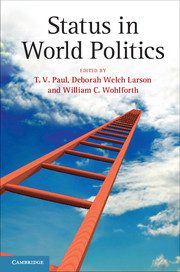Book contents
- Frontmatter
- Contents
- Figures
- Tables
- Contributors
- Acknowledgments
- Part I Introduction
- Part II Admission into the Great-Power Club
- Part III Status Signaling
- 5 Status Dilemmas and Interstate Conflict
- 6 Status Signaling, Multiple Audiences, and China’s Blue-Water Naval Ambition
- Part IV International Institutions and Status
- Part V Status, Authority, and Structure
- Part VI Conclusions
- Index
- References
6 - Status Signaling, Multiple Audiences, and China’s Blue-Water Naval Ambition
Published online by Cambridge University Press: 05 June 2014
- Frontmatter
- Contents
- Figures
- Tables
- Contributors
- Acknowledgments
- Part I Introduction
- Part II Admission into the Great-Power Club
- Part III Status Signaling
- 5 Status Dilemmas and Interstate Conflict
- 6 Status Signaling, Multiple Audiences, and China’s Blue-Water Naval Ambition
- Part IV International Institutions and Status
- Part V Status, Authority, and Structure
- Part VI Conclusions
- Index
- References
Summary
Relations among established and ascending powers tend to be troubled and often violent. According to power transition theory, the onset of war between a dominant and rising power grows more likely as the gap in relative strength between them narrows and as the latter’s grievances with the existing order – grievances that expand in lockstep with its mounting capabilities – move beyond any hope of peaceful resolution. Little wonder, then, that rising powers have been portrayed in both theory and practice as “troublemakers” that “feel constrained, even cheated, by the status quo and struggle against it to take what they think is rightfully theirs.” And because status demands are usually at the forefront of their dissatisfaction with the established order, rising powers are expected to act assertively to signal their increased strength and preferred higher status.
Contrary to this familiar story, we argue that status signaling among rising powers is a more complicated matter, particularly in the current world, than is typically assumed. First, rising powers do not always choose to maximize their international status. Determined to sustain their growth trajectory, emerging powers tend to be inward-looking states, reluctant to take on the burdens and responsibilities associated with a leading role on the world stage. Second, national leaders of rising powers face multiple audiences, making it difficult for them to send clear and coherent signals and to target only specific audiences. Third, and unique to current international politics, contemporary China (owing to the unprecedented size of its population) possesses historically unparalleled flexibility in terms of the type of status it can choose to signal. No other state in history has ever boasted the world’s second-largest economy while ranking 100 among all countries in GDP at purchasing power parity (PPP) per capita. China is a veritable optical illusion; a state that can be seen (and, therefore, credibly signaled) as both a powerful rising challenger and a weak developing country.
Information
- Type
- Chapter
- Information
- Status in World Politics , pp. 141 - 162Publisher: Cambridge University PressPrint publication year: 2014
References
Accessibility standard: Unknown
Why this information is here
This section outlines the accessibility features of this content - including support for screen readers, full keyboard navigation and high-contrast display options. This may not be relevant for you.Accessibility Information
- 38
- Cited by
